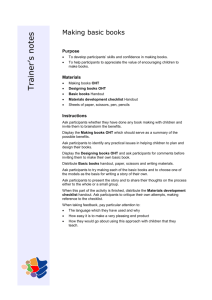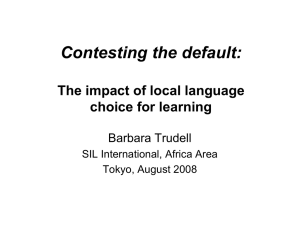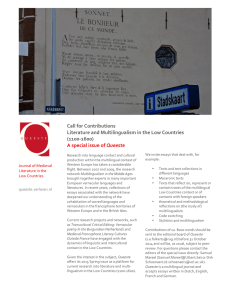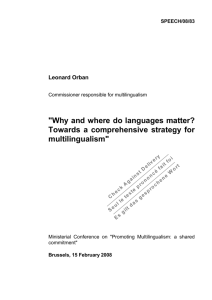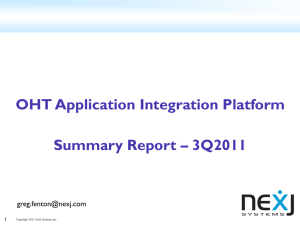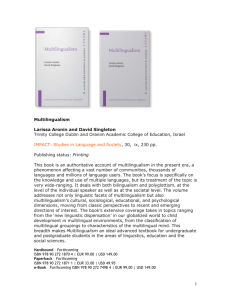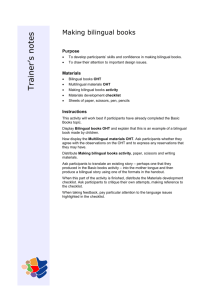Multilingualism trainer`s handbook
advertisement
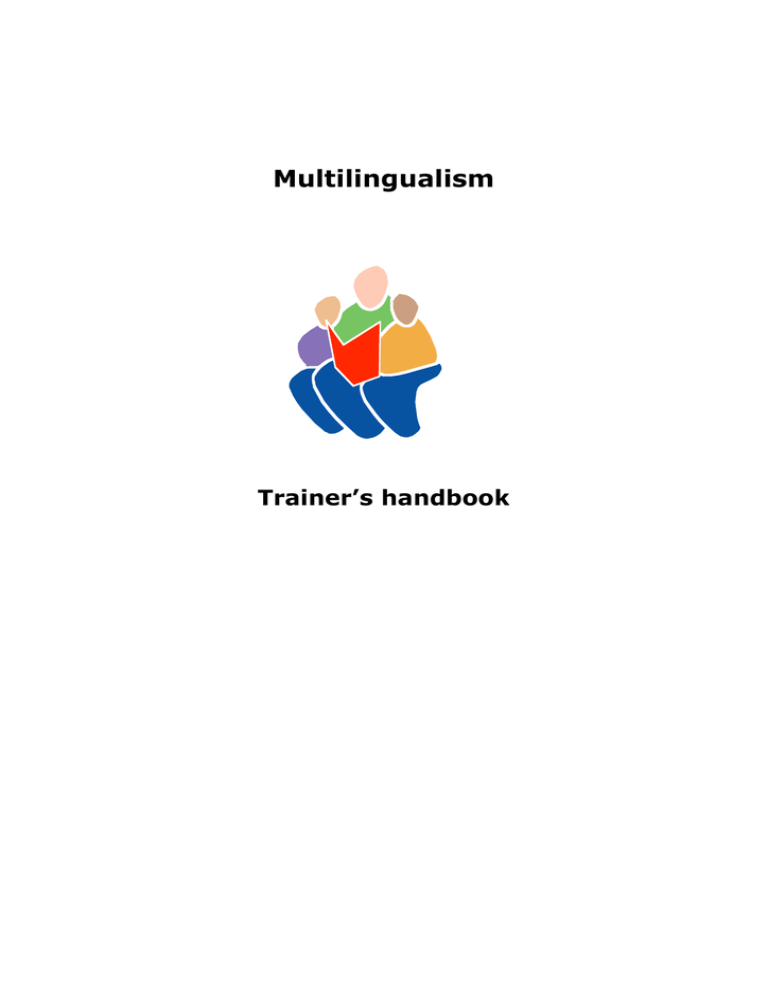
Multilingualism Trainer’s handbook Contents How to use this handbook 3 Multilingualism objectives OHT 4 Advantages of Multilingualism Trainers notes 5 Advantages of Multilingualism OHT 6 Multilingualism OHT 6 Multilingualism quiz Trainers notes 7 Multilingualism quiz OHT 8 Multilingualism quiz key handout 9 Theories of bilingualism OHT 10 Language biographies Trainers notes 11 Language biographies handout 12 Patterns of language OHT 13 Language, culture and identity OHT 13 Models of education Trainers notes 14 Arguments against the mother tongue in education OHT Arguments for the mother tongue in education OHT Mother tongue based bilingual education OHT Models of education activity handout Models of education activity: key handout Advantages of multilingualism OHT 15 15 16 17 17 18 2 How to use this handbook Objectives This module sets out to: • • • • provide an understanding of theories of bilingualism explore participants’ attitudes towards bilingualism challenge myths about multilingualism consider the implications of bilingualism for eductaion. Structure The topics covered are: • • • • advantages of multilingualism multilingualism quiz language biographies models of education Organization Each activity: • starts with teacher’s notes which set out the purpose of the activity, the materials required and instructions for how to proceed • Is followed by the relevant OHTs and handouts. Key Teacher’s notes Handout OHTs 3 4 Advantages of multilingualism Purpose To explore participants’ attitudes towards multilingualism. Materials For this activity you will need: • Multilingualism OHT • Advantages of multilingualism OHT Instructions Display Multilingualism OHT. Ask participants to think first about their own situation and then to brainstorm in small groups of 3 or 4 on the benefits of bilingualism. Take feedback from the group. Then display Advantages of multilingualism OHT as a point of comparison with the group deliberations. 5 6 Multilingualism quiz Purpose To explore participants’ attitudes towards multilingualism and challenge some important myths Materials Multilingualism quiz OHT Multilingualism quiz key handout Theories of bilingualism OHT Instructions Display Multilingualism quiz OHT When participants have completed the quiz, distribute Multilingualism quiz: key handout, which gives the answers. Note any comments and direct people to the suggestions for further reading on the handout if they wish to follow up on any of the issues raised. Follow up by showing Theories of bilingualism OHT. 7 8 Multilingualism quiz: key 1. Speaking two or more languages places unnecessary emotional strain on children. FALSE: speaking more than one language does not create emotional strain. Higher levels of self-esteem have been reported in children who have a good grounding in their mother tongue and also know other languages. 2. Children who learn more than one language do not become fluent in any of these languages. FALSE: Children can become fluent in more than one language and for many people throughout the world multilingualism is very common. The level of fluency depends on factors such as the language programme children follow in school and the extent of parental support. In Canada and the USA, many rich parents choose to send their children to schools with immersion programmes in French. 3. Multilingualism is a positive social and personal resource. TRUE: The ability to speak the mother tongue as well as the national language and an international language creates a much wider range of life choices for individuals but can also achieve national unity. 4. Speaking more than one language interferes with children’s intellectual development. FALSE: There is no scientific evidence that learning more than one language is intellectually damaging. Children who have a good understanding of how different languages function are more likely to have good analytical skills and are often more effective communicators. 5. Multilingual societies are usually poor and underdeveloped. FALSE: There is no evidence to show that multilingual countries are more disadvantages than monolingual countries. Social disadvantage is caused by factors other than language. 6. It is important educationally that children learn in their mother tongues in the early years of schooling. TRUE: Research shows that supporting children’s first language will enhance the acquisition of the second and third language. For further reading on multilingualism see: Baker, C. (2000) A teachers’ and parents’ guide to bilingualism. Clevedon, Avon: Multilingual Matters. Baker, C. (2000) Foundations of bilingualism and bilingual education. Clevedon, Avon: Multilingual Matters. 9 10 Language biographies Purpose To make participants think about their own patterns of language use and the links between language, culture and identiy. Materials Language biographies activity Patterns of language OHT Language, culture and identity OHT Instructions Distribute the Language biographies activity and explain how the model drawing was produced. Ask participants to make their own drawings. Choose several participants to share their silhouettes with the whole group. Display Patterns of language OHT which should sum up some of the points which will have arisen from the discussion. Now display Language, culture and identity OHT. Ask participants to consider in pairs or small groups whether these summary statements correspond with their own views and experiences. 11 Language biographies The drawings below were produced as part of a language biography workshop. Participants were given a silhouette and asked to find a way of indicating which languages they associated with different parts of their bodies. Make your own silhouette to show the associations you have with the languages you speak. 12 13 Models of education Purpose To help participants: • understand the arguments for and against the use of mother tongue education. • familiarise themselves with the different models of educational provision in multilingual societies. Materials Arguments for the mother tongue OHT Arguments against the mother tongue OHT Mother tongue based bilingual education OHT Models of education activity Models of education: key handout Advantages of multilingualism OHT Instructions Ask participants to discuss in pairs or small groups the advantages of mother tongue education. Take feedback, then display Arguments for the mother tongue OHT. Ask participants to discuss in pairs or small groups the disadvantages of mother tongue education. Take feedback, then display Arguments against the mother tongue OHT. Now display and read through the Mother tongue based bilingualism OHT. Ask participants to think about their own situation and consider whether this model could work for them. Distribute the Models of education activity. Ask participants to fill in the blanks in the table. Distribute the Models of education: key handout. When taking feedback, pay special attention to: • The ways in which children benefit from bilingual education. The ways in which instruction in the language of power (ex colonial language) places them at a disadvantage. By way of summary, display Advantages of multilingual education OHT. • 14 15 16 17 18
